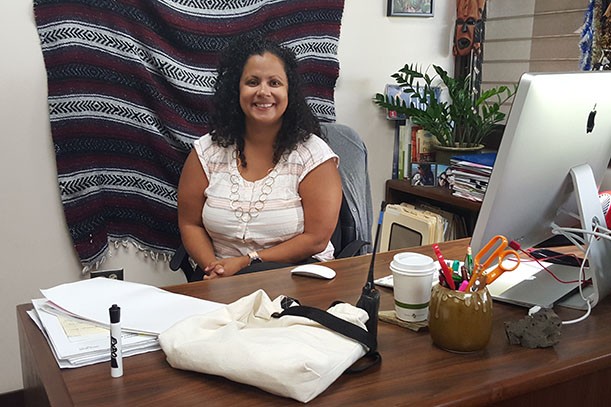By Elizabeth Samoa, Kapi‘o Staff Writer /
This semester, the University of Hawai‘i system updated its policy on sex discrimination and gender-based violence, bringing new processes, procedures and resources to Kapi‘olani Community College, via Title IX, the Office of Institutional Equity (OIE), and new Vice Chancellor of Student Affairs and Title IX Coordinator Brenda Ivelisse.
The new policy more clearly and fully defines the types of behavior prohibited throughout the UH system, expands resources devoted to dealing with sex discrimination and gender-based violence, and creates ways for students, faculty and staff to comfortably and confidentially report incidents or seek help.
Ivelisse, who previously served as Associate Dean of Students at Portland Community College, was brought in less than a year ago to help develop the policy. Ivelisse has extensive experience working with issues related to Title IX, the federal law that prohibits discrimination on the basis of sex in federally funded education programs or activities.
Ivelisse explained that the previous UH policy lacked definition and had minimal procedures and resources for students. The new policy expands options for all members of the UH system specifically includes same-sex discrimination.
Under the new policy, anyone who wishes to report an incident can call, visit, or email designated Title IX coordinators or fill out the online form available via their campus. Other options are also listed on the Title IX website.
One of the newest and most popular resources available are the confidential sessions. In these sessions, students and faculty can privately share their experiences and feelings without having to worry about other people knowing. According to Ivelisse, most students prefer to attend sessions than reporting or having to speak directly to a coordinator. Many steps are being taken to provide students with more comfortable settings to express themselves.
“I don’t want students in pain,” said Ivelisse.
A big problem with these types of incidents is that victims are too afraid to step forward or are unaware of the services offered on campus and often suffer quietly.
Corey Jannis, third-year student at KCC knew nothing about Title XI and the services offered by the OIE
“I know someone who had a problem like that,” he said. “They may have benefited from knowing about Title IX.”
The committee has been working with the student government to create a video to demonstrate how to recognize sexual violence, harassment, or other unsafe occurrences and what to do about it. Students have also been provided online training in how to recognize when they or others are being discriminated against or harassed.
The most important aspect of the new system at KCC is giving students options and empowering them to be educated and in control of their situation.
Ivelisse said she keeps her focus on the students, seeking the most effective and efficient ways to help each individual. She works with not only victims, but also those accused of violations by talking things out and directly addressing the matter.
Ivelisse said that after speaking with alleged offenders, “99% are not repeats.”
Most cases involve domestic violence or stalking.
Ivelisse once worked with a student who felt that another student was stalking him/her. Ivelisse was able to work with both students and solve the issue at hand. She spoke with the accused and asked questions such as “Why did you do that?” or “How do you think that made the other person feel?” In the end the student was able to understand his/her actions and reflected on it in a way that prevented repeat behavior.
In the near future, Ivelisse and the rest of the Title IX committee will focus on training faculty and staff on how to help students. The committee also wants to educate students about how to help others who find themselves in sexual discrimination or gender-based violence situations.

